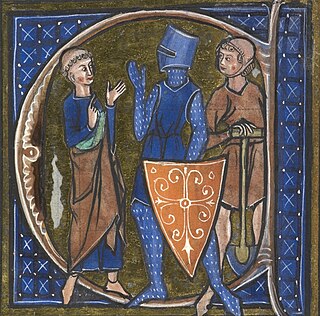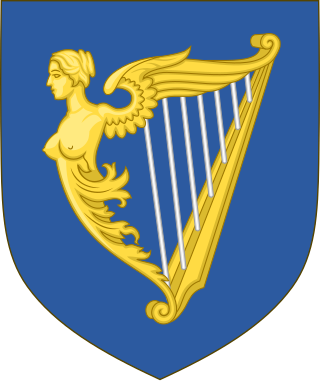The House of Lords is the upper house of the Parliament of the United Kingdom.
Contents
House of Lords may also refer to:
The House of Lords is the upper house of the Parliament of the United Kingdom.
House of Lords may also refer to:

The House of Lords is the upper house of the Parliament of the United Kingdom. Like the lower house, the House of Commons, it meets in the Palace of Westminster in London, England. One of the oldest institutions in the world, its origins lie in the early 11th century and the emergence of bicameralism in the 13th century.

The Parliament of the United Kingdom of Great Britain and Northern Ireland is the supreme legislative body of the United Kingdom, and may also legislate for the Crown Dependencies and the British Overseas Territories. It meets at the Palace of Westminster in London. Parliament possesses legislative supremacy and thereby holds ultimate power over all other political bodies in the United Kingdom and the Overseas Territories. While Parliament is bicameral, it has three parts: the sovereign (King-in-Parliament), the House of Lords, and the House of Commons. In theory, power is officially vested in the King-in-Parliament. However, the Crown normally acts on the advice of the prime minister, and the powers of the House of Lords are limited to only delaying legislation; thus power is de facto vested in the House of Commons.
Peerages in the United Kingdom form a legal system comprising both hereditary and lifetime titles, composed of various ranks, and within the framework of the Constitution of the United Kingdom form a constituent part of the legislative process and the British honours system. The British monarch is considered the fount of honour and is notionally the only person who can grant peerages, though there are many conventions about how this power is used, especially at the request of the British government. The term peerage can be used both collectively to refer to the entire body of titled nobility, and individually to refer to a specific title. British peerage title holders are termed peers of the Realm.
Lord is an appellation for a person or deity who has authority, control, or power over others, acting as a master, chief, or ruler. The appellation can also denote certain persons who hold a title of the peerage in the United Kingdom, or are entitled to courtesy titles. The collective "Lords" can refer to a group or body of peers.

Baron is a rank of nobility or title of honour, often hereditary, in various European countries, either current or historical. The female equivalent is baroness. Typically, the title denotes an aristocrat who ranks higher than a lord or knight, but lower than a viscount or count. Often, barons hold their fief – their lands and income – directly from the monarch. Barons are less often the vassals of other nobles. In many kingdoms, they were entitled to wear a smaller form of a crown called a coronet.

Whilst the House of Lords of the United Kingdom is the upper chamber of Parliament and has government ministers, for many centuries it had a judicial function. It functioned as a court of first instance for the trials of peers and for impeachments, and as a court of last resort in the United Kingdom and prior, the Kingdom of Great Britain and the Kingdom of England.

The Right Honourable is an honorific style traditionally applied to certain persons and collective bodies in the United Kingdom, the former British Empire and the Commonwealth of Nations. The term is predominantly used today as a style associated with the holding of certain senior public offices in the United Kingdom, Canada, New Zealand, and, to a lesser extent, Australia.

Parliament House in Dublin, Ireland, was home to the Parliament of Ireland, and since 1803 has housed the Bank of Ireland. It was the world's first purpose-built bicameral parliament house. It is located at College Green.
The order of precedence in the United Kingdom is the sequential hierarchy for Peers of the Realm, officers of state, senior members of the clergy, holders of the various Orders of Chivalry, and is mostly determined, but not limited to, birth order, place in the line of succession, or distance from the reigning monarch. The order of precedence can also be applied to other persons in the three legal jurisdictions within the United Kingdom:

The Peerage Act 1963 is an Act of the Parliament of the United Kingdom that permits women peeresses and all Scottish hereditary peers to sit in the House of Lords and allows newly inherited hereditary peerages to be disclaimed.

The estates of the realm, or three estates, were the broad orders of social hierarchy used in Christendom from the Middle Ages to early modern Europe. Different systems for dividing society members into estates developed and evolved over time.

The term magnate, from the late Latin magnas, a great man, itself from Latin magnus, "great", means a man from the higher nobility, a man who belongs to the high office-holders or a man in a high social position, by birth, wealth or other qualities in Western Christian countries since the medieval period. It also includes the members of the higher clergy, such as bishops, archbishops and cardinals. In reference to the medieval, the term is often used to distinguish higher territorial landowners and warlords, such as counts, earls, dukes, and territorial-princes from the baronage, and in Poland for the richest szlachta.
In the United Kingdom, representative peers were those peers elected by the members of the Peerage of Scotland and the Peerage of Ireland to sit in the British House of Lords. Until 1999, all members of the Peerage of England held the right to sit in the House of Lords; they did not elect a limited group of representatives. All peers who were created after 1707 as Peers of Great Britain and after 1801 as Peers of the United Kingdom held the same right to sit in the House of Lords.

The Irish House of Lords was the upper house of the Parliament of Ireland that existed from medieval times until 1801. It was also the final court of appeal of the Kingdom of Ireland.
The history of the British peerage, a system of nobility found in the United Kingdom, stretches over the last thousand years. The current form of the British peerage has been a process of development. While the ranks of baron and earl predate the British peerage itself, the ranks of duke and marquess were introduced to England in the 14th century. The rank of viscount came later, in the mid-15th century. Peers were summoned to Parliament, forming the House of Lords.

A peer of the realm is a member of the highest aristocratic social order outside the ruling dynasty of the kingdom.

The Lords Temporal are secular members of the House of Lords, the upper house of the British Parliament. These can be either life peers or hereditary peers, although the hereditary right to sit in the House of Lords was abolished for all but ninety-two peers during the 1999 reform of the House of Lords. The term is used to differentiate these members from the Lords Spiritual, who sit in the House as a consequence of being bishops in the Church of England.
The Chamber of Peers or House of Peers refers to the legislative upper house in several countries with a peerage :
The British nobility is made up of the peerage and the (landed) gentry. The nobility of its four constituent home nations has played a major role in shaping the history of the country, although the hereditary peerage now retain only the rights to stand for election to the House of Lords, dining rights there, position in the formal order of precedence, the right to certain titles, and the right to an audience with the monarch. More than a third of British land is in the hands of aristocrats and traditional landed gentry.
A peerage is a legal system historically comprising various hereditary titles in a number of countries, and composed of assorted noble ranks.